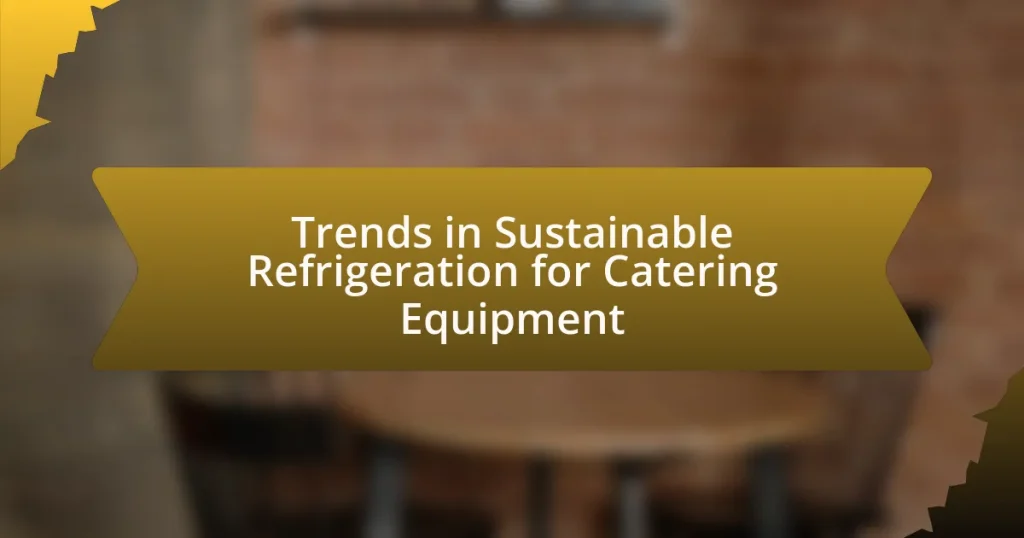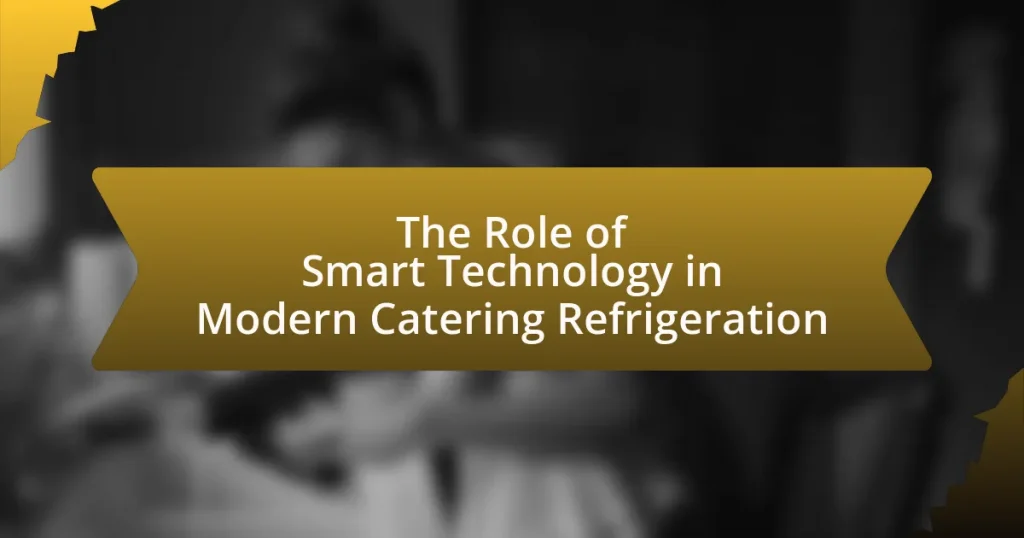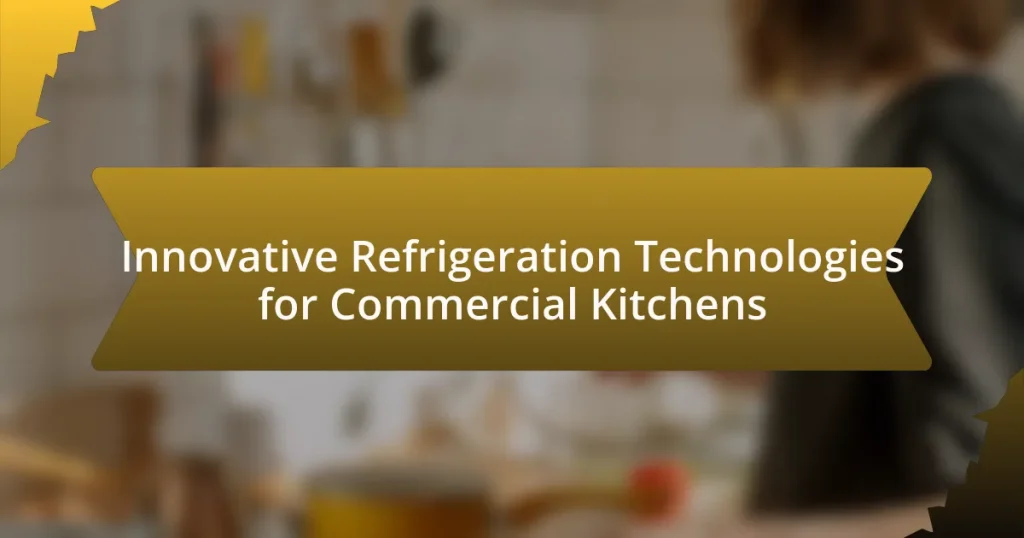The article focuses on the top five essential cleaning tools that every catering business should possess: commercial dishwashers, microfiber cloths, heavy-duty trash bags, floor scrubbers, and sanitizing solutions. It emphasizes the importance of these tools in maintaining hygiene, efficiency, and compliance with health regulations, which are critical for preventing foodborne illnesses and ensuring customer safety. Additionally, the article discusses the features to consider when selecting cleaning tools, such as durability, ease of use, and versatility, while also highlighting best practices for maintaining these tools to enhance their effectiveness in catering operations.
What are the Top 5 Cleaning Tools Every Catering Business Should Have?
The top 5 cleaning tools every catering business should have are commercial dishwashers, microfiber cloths, heavy-duty trash bags, floor scrubbers, and sanitizing solutions. Commercial dishwashers efficiently clean large volumes of dishes and utensils, ensuring hygiene standards are met. Microfiber cloths are effective for dusting and wiping surfaces without leaving lint. Heavy-duty trash bags are essential for managing waste during events, preventing leaks and odors. Floor scrubbers maintain cleanliness in high-traffic areas, reducing slip hazards. Lastly, sanitizing solutions are crucial for disinfecting surfaces and equipment, ensuring food safety compliance.
Why is it important for catering businesses to have the right cleaning tools?
It is important for catering businesses to have the right cleaning tools because these tools ensure hygiene, efficiency, and compliance with health regulations. Proper cleaning tools help prevent foodborne illnesses by effectively removing contaminants and bacteria from surfaces and equipment. According to the Centers for Disease Control and Prevention, proper sanitation practices can reduce the risk of foodborne outbreaks, which is critical for maintaining customer safety and trust. Additionally, using the right tools can streamline cleaning processes, saving time and labor costs, which ultimately enhances overall operational efficiency in a catering environment.
How do cleaning tools impact food safety in catering?
Cleaning tools significantly impact food safety in catering by ensuring that surfaces, utensils, and equipment are free from contaminants. Effective cleaning tools, such as sanitizing wipes, mops, and dishwashing equipment, help eliminate bacteria and pathogens that can cause foodborne illnesses. For instance, the Centers for Disease Control and Prevention (CDC) states that proper cleaning and sanitization can reduce the risk of foodborne outbreaks, highlighting the importance of using appropriate cleaning tools in food preparation areas. Regular use of these tools not only maintains hygiene standards but also complies with health regulations, thereby safeguarding public health.
What role do cleaning tools play in maintaining a professional image?
Cleaning tools are essential in maintaining a professional image by ensuring cleanliness and hygiene in any environment. A well-maintained space reflects attention to detail and professionalism, which can enhance customer trust and satisfaction. For instance, studies show that 75% of customers judge a business’s quality based on its cleanliness. Therefore, using appropriate cleaning tools not only facilitates effective cleaning but also communicates a commitment to high standards, ultimately influencing customer perceptions and business reputation.
What are the essential features to look for in cleaning tools for catering?
Essential features to look for in cleaning tools for catering include durability, ease of use, versatility, and compliance with health standards. Durability ensures that tools withstand frequent use in a busy catering environment, while ease of use allows staff to clean efficiently without excessive effort. Versatility is important as tools should be effective on various surfaces and types of messes. Compliance with health standards is crucial to ensure that cleaning tools do not harbor bacteria or contaminants, which is vital in food service settings. These features collectively enhance the effectiveness and safety of cleaning operations in catering businesses.
How does durability affect the choice of cleaning tools?
Durability significantly influences the choice of cleaning tools by determining their lifespan and effectiveness in high-use environments. In catering businesses, where tools are subjected to frequent and rigorous cleaning tasks, selecting durable materials ensures that the tools can withstand wear and tear, reducing the need for frequent replacements. For instance, tools made from stainless steel or high-grade plastics are preferred because they resist corrosion and damage, thereby maintaining their functionality over time. This choice not only enhances operational efficiency but also contributes to cost savings, as investing in durable cleaning tools minimizes long-term expenses associated with replacements and repairs.
Why is ease of use important for catering cleaning tools?
Ease of use is crucial for catering cleaning tools because it directly impacts efficiency and effectiveness in a fast-paced environment. Catering businesses often operate under tight schedules, requiring tools that can be quickly and easily utilized to maintain cleanliness and hygiene standards. For instance, tools designed with ergonomic features and intuitive operation reduce the time staff spend on cleaning tasks, allowing them to focus on service delivery. Research indicates that user-friendly cleaning equipment can enhance productivity by up to 25%, as employees can complete tasks more swiftly and with less physical strain. This efficiency not only improves workflow but also contributes to a safer and more sanitary environment, which is essential in the catering industry.
Which specific cleaning tools are indispensable for catering businesses?
Indispensable cleaning tools for catering businesses include commercial dishwashers, sanitizing solutions, microfiber cloths, floor scrubbers, and industrial trash bins. Commercial dishwashers efficiently clean large volumes of dishes, ensuring hygiene standards are met. Sanitizing solutions are essential for disinfecting surfaces and equipment, critical in food safety. Microfiber cloths effectively trap dirt and bacteria, making them ideal for various cleaning tasks. Floor scrubbers maintain cleanliness in high-traffic areas, reducing slip hazards. Industrial trash bins facilitate proper waste disposal, essential for maintaining a clean environment. These tools collectively enhance operational efficiency and compliance with health regulations in catering settings.
What is the first essential cleaning tool every catering business should have?
The first essential cleaning tool every catering business should have is a commercial-grade dishwashing machine. This equipment is crucial for efficiently sanitizing dishes, utensils, and cookware, ensuring compliance with health regulations. A study by the National Restaurant Association highlights that proper sanitation is vital for food safety, and a commercial dishwasher can reduce water usage by up to 50% compared to hand washing, making it both effective and environmentally friendly.
How does a commercial-grade mop enhance cleaning efficiency?
A commercial-grade mop enhances cleaning efficiency by utilizing superior materials and design that allow for faster and more effective dirt and grime removal. These mops often feature high-absorbency microfiber heads that trap more dust and debris compared to standard mops, resulting in a cleaner surface with fewer passes. Additionally, commercial-grade mops are typically designed for ergonomic use, reducing user fatigue and enabling quicker cleaning across large areas, which is essential in a catering business where time is critical. The combination of advanced materials and user-friendly design leads to a significant reduction in cleaning time and improved sanitation, making them an essential tool for maintaining hygiene standards in food service environments.
What types of mops are best suited for catering environments?
The best types of mops suited for catering environments are microfiber mops, string mops, and flat mops. Microfiber mops effectively trap dirt and bacteria, making them ideal for maintaining hygiene standards in food service areas. String mops are versatile and can cover large areas quickly, which is beneficial for busy catering settings. Flat mops, often used with disposable pads, provide a quick and efficient cleaning solution while minimizing cross-contamination risks. These mops are designed to meet the rigorous cleaning demands of catering environments, ensuring both cleanliness and safety.
What is the second essential cleaning tool every catering business should have?
The second essential cleaning tool every catering business should have is a commercial-grade mop. A commercial-grade mop is crucial for efficiently cleaning large areas, such as kitchens and dining spaces, where spills and food debris are common. This type of mop is designed for heavy-duty use, ensuring durability and effectiveness in maintaining hygiene standards.
Why is a high-quality dishwashing detergent crucial for catering?
A high-quality dishwashing detergent is crucial for catering because it ensures effective cleaning and sanitation of kitchenware, which is essential for food safety. In a catering environment, where large volumes of dishes, utensils, and equipment are used, a superior detergent effectively removes grease, food residues, and bacteria, preventing cross-contamination. Studies show that using high-quality detergents can reduce the presence of harmful pathogens on surfaces, thereby minimizing the risk of foodborne illnesses. Additionally, high-quality detergents often contain enzymes that break down tough stains and residues more efficiently, saving time and labor in a fast-paced catering setting.
What features should a dishwashing detergent possess for optimal results?
A dishwashing detergent should possess strong grease-cutting ability, effective antibacterial properties, and a pleasant scent for optimal results. Strong grease-cutting ability ensures that tough food residues are easily removed, which is essential in a catering environment where dishes often have heavy soiling. Effective antibacterial properties are crucial for sanitizing dishes, as they help eliminate harmful bacteria, ensuring food safety. A pleasant scent enhances the user experience, making the cleaning process more enjoyable. These features collectively contribute to the efficiency and effectiveness of dishwashing detergents in catering businesses.
What is the third essential cleaning tool every catering business should have?
The third essential cleaning tool every catering business should have is a commercial-grade floor scrubber. This tool is crucial for maintaining hygiene and cleanliness in high-traffic areas, as it effectively removes dirt, grease, and spills from various floor surfaces. A commercial-grade floor scrubber can significantly reduce the time and labor required for manual cleaning, ensuring that catering environments remain safe and sanitary for food preparation and service.
How does a powerful vacuum cleaner contribute to cleanliness in catering?
A powerful vacuum cleaner significantly enhances cleanliness in catering by efficiently removing food particles, dust, and allergens from various surfaces. Its strong suction capabilities ensure thorough cleaning in high-traffic areas, such as kitchens and dining spaces, where spills and debris are common. Studies indicate that effective vacuuming can reduce the presence of harmful bacteria and improve indoor air quality, which is crucial in food service environments. This contributes to a healthier atmosphere for both staff and customers, ultimately supporting food safety standards and enhancing the overall dining experience.
What types of vacuum cleaners are most effective for catering businesses?
Commercial-grade vacuum cleaners are the most effective for catering businesses. These vacuum cleaners are designed to handle high volumes of debris and are equipped with powerful motors that ensure efficient cleaning in busy environments. Additionally, models with HEPA filters are beneficial as they capture allergens and fine particles, promoting a healthier workspace. Research indicates that commercial vacuums can reduce cleaning time by up to 30% compared to standard models, making them ideal for catering operations that require quick turnaround times.
What is the fourth essential cleaning tool every catering business should have?
The fourth essential cleaning tool every catering business should have is a commercial-grade floor scrubber. This tool is crucial for maintaining hygiene and cleanliness in high-traffic areas, ensuring that floors are free from grease, spills, and food particles. A commercial-grade floor scrubber can effectively clean large surfaces quickly, which is vital in a catering environment where time is often limited. Its efficiency is supported by the fact that using a floor scrubber can reduce cleaning time by up to 75% compared to traditional mopping methods, making it an indispensable asset for catering operations.
Why is a multi-surface cleaner important for catering operations?
A multi-surface cleaner is important for catering operations because it ensures effective sanitation across various surfaces, which is crucial for food safety. Catering environments often involve diverse materials such as stainless steel, plastic, and wood, all of which require appropriate cleaning solutions to eliminate bacteria and prevent cross-contamination. Studies indicate that using a multi-surface cleaner can reduce the presence of harmful pathogens by up to 99.9%, thereby enhancing hygiene standards in food preparation areas. This versatility not only streamlines cleaning processes but also supports compliance with health regulations, making it an essential tool for catering businesses.
What ingredients should be avoided in multi-surface cleaners for food safety?
Multi-surface cleaners for food safety should avoid ingredients such as bleach, ammonia, and phosphates. Bleach can leave harmful residues that contaminate food surfaces, while ammonia can produce toxic fumes when mixed with other cleaners. Phosphates can contribute to water pollution and may not be safe for food contact surfaces. These ingredients pose risks to health and safety, making them unsuitable for use in environments where food is prepared or served.
What is the fifth essential cleaning tool every catering business should have?
The fifth essential cleaning tool every catering business should have is a commercial-grade floor scrubber. This tool is crucial for maintaining hygiene and cleanliness in high-traffic areas, ensuring that floors are not only clean but also safe for staff and customers. Commercial-grade floor scrubbers are designed to handle large spaces efficiently, using powerful scrubbing and drying mechanisms that reduce the risk of slips and falls. Their effectiveness is supported by industry standards, which emphasize the importance of maintaining clean surfaces in food service environments to prevent contamination and uphold health regulations.
How does a reliable trash disposal system support cleanliness in catering?
A reliable trash disposal system supports cleanliness in catering by ensuring the efficient and hygienic removal of waste. This system minimizes the risk of contamination and unpleasant odors, which can negatively impact food safety and customer experience. For instance, according to the Food and Drug Administration (FDA), proper waste management is crucial in preventing pest infestations and maintaining sanitary conditions in food service environments. By providing designated receptacles and regular collection schedules, a reliable trash disposal system helps caterers maintain a clean workspace, thereby enhancing overall operational efficiency and compliance with health regulations.
What features should a trash disposal system have for catering use?
A trash disposal system for catering use should have durability, efficiency, and ease of use. Durability ensures that the system can withstand the high volume of waste generated during events, while efficiency allows for quick disposal to maintain cleanliness and hygiene. Ease of use is crucial for staff to operate the system without complications, facilitating a smooth workflow. Additionally, features such as odor control, safety mechanisms to prevent accidents, and compatibility with various waste types enhance the system’s effectiveness in a catering environment. These features collectively contribute to maintaining a clean and organized catering operation, which is essential for food safety and customer satisfaction.
How can catering businesses effectively maintain their cleaning tools?
Catering businesses can effectively maintain their cleaning tools by implementing a regular cleaning and inspection schedule. This involves daily cleaning after use, ensuring tools are free from food residue and contaminants, and conducting weekly inspections to identify any wear or damage. Regular maintenance not only prolongs the lifespan of the tools but also ensures compliance with health and safety regulations, which require that all equipment be kept in a sanitary condition. Additionally, using appropriate cleaning agents that are compatible with the materials of the tools can prevent corrosion and degradation, further enhancing their durability.
What are the best practices for cleaning and storing catering tools?
The best practices for cleaning and storing catering tools include thorough washing, sanitizing, and proper organization. Catering tools should be washed with hot, soapy water immediately after use to remove food residues, followed by sanitization using a food-safe sanitizer to eliminate bacteria. After cleaning, tools should be air-dried or dried with clean towels to prevent moisture buildup, which can lead to mold or bacteria growth.
For storage, catering tools should be organized in designated areas, preferably in clean, dry containers or racks that allow for air circulation. This prevents cross-contamination and ensures easy access during catering events. Regularly inspecting storage areas for cleanliness and proper organization further enhances hygiene and efficiency.
How often should cleaning tools be inspected and maintained?
Cleaning tools should be inspected and maintained at least once a month. Regular inspections help identify wear and tear, ensuring tools function effectively and hygienically. Maintenance tasks, such as cleaning and replacing worn parts, contribute to the longevity and efficiency of the tools, which is crucial in a catering business where cleanliness is paramount.
What common mistakes should be avoided when maintaining cleaning tools?
Common mistakes to avoid when maintaining cleaning tools include neglecting regular cleaning, using inappropriate cleaning agents, failing to inspect for damage, not storing tools properly, and overlooking the need for replacement. Regular cleaning prevents the buildup of dirt and bacteria, which can compromise hygiene standards in catering. Using inappropriate cleaning agents can damage tools, leading to reduced effectiveness and lifespan. Regular inspections help identify wear and tear, ensuring tools remain safe and functional. Proper storage protects tools from damage and contamination, while timely replacement of worn-out tools ensures optimal performance.
What tips can enhance the effectiveness of cleaning tools in catering?
To enhance the effectiveness of cleaning tools in catering, ensure proper maintenance and regular replacement of tools. Regular maintenance, such as cleaning and sanitizing tools after each use, prevents the buildup of bacteria and grime, which can compromise hygiene standards. Additionally, replacing worn-out tools, like mops and scrubbers, ensures optimal performance and efficiency. Studies indicate that using well-maintained tools can reduce cleaning time by up to 30%, thereby improving overall operational efficiency in catering environments.
How can staff training improve the use of cleaning tools?
Staff training can significantly enhance the use of cleaning tools by ensuring employees understand proper techniques and maintenance practices. When staff are trained, they learn how to effectively operate each tool, which increases efficiency and reduces the risk of damage. For example, training on the correct use of a commercial dishwasher can lead to better cleaning results and lower water and energy consumption. Additionally, well-trained staff are more likely to adhere to safety protocols, minimizing accidents and injuries associated with improper tool use. Studies show that organizations investing in training see a marked improvement in operational performance, including a 20% increase in productivity related to cleaning tasks.
What scheduling practices can optimize cleaning tool usage in catering?
Implementing a structured cleaning schedule can optimize cleaning tool usage in catering. By establishing specific time slots for cleaning tasks, catering businesses can ensure that tools are used efficiently and maintained regularly. For instance, scheduling cleaning sessions immediately after service can prevent tool contamination and prolong their lifespan. Additionally, rotating the use of tools based on their specific cleaning requirements can minimize wear and tear, ensuring that each tool is utilized effectively. Research indicates that systematic cleaning schedules can reduce operational downtime by up to 30%, thereby enhancing overall productivity in catering operations.



